How to dispose of dog feces correctly?

Table of contents
Do you know where to dispose of dog feces? Even with experience with animals, many guardians still have doubts about what to do with their dog's waste and even dispose of it the wrong way. Dog poop is considered sanitary waste, so knowing how to dispose of dog feces, both at home and on the street, correctly is a public health issue. As this is a common question among so many parentsand pet moms, we went after information to teach what to do with dog poop and thus avoid damage to the environment and the health of animals and humans.
See_also: Feline Platinosomosis: veterinarian clarifies everything about the disease caused by the ingestion of lizardsDog faeces: how to dispose of it?
If your dog goes potty at home, you should be even more careful, especially if there is no waste separation in your street or condominium. Considered sanitary waste, dog poop needs to go to the correct destination to avoid soil contamination and disease transmission. The most correct way to dispose of pet waste is in the toilet. In this way, thedog feces will be properly treated by your city's sewer system. This is the correct procedure to do regardless of the dog's toilet choice (whether it's newspaper, sanitary mats or washable toilet mats).

What about during walking? How to dispose of dog feces on the street?
The poop scoop is an indispensable item for walking with a dog. Leaving poop on the ground is impolite and can also cause inconvenience to the population, which makes it even more difficult to accept pets in public spaces. In addition, it is a public health practice, since waste can transmit diseases. It is the duty of every citizen and guardian to collect dog feces and dispose of it in the correct way.In fact, it is no use picking up the dog's poop and leaving the bag on the ground or in the corner of a tree: correct disposal is just as important as not leaving the feces on the street.
In these cases, you can dispose of it in garbage cans, but ideally in a container intended for organic waste. It is also important to always tie the bag tightly to prevent it from breaking. Another concern when disposing of it on the street is the material to collect the dog's feces. Biodegradable bags are the most sustainable options for throwing dog poop away on the street.They are usually made of materials that take less time to decompose - even some brands produce bags that break down on contact with water and can be thrown in the toilet.
Contact with dog feces can transmit diseases
The quick and correct disposal of dog feces is important mainly because the dog's dog feces can transmit diseases, some of which are considered zoonoses - that is, they can be transmitted to humans. Among the most common diseases that can be transmitted by the dog poop are: canine parvovirus, tapeworm, toxocariasis, geographic worm and canine giardia. Always be aware and always clean your dog's waste, both at home and on the street. Also, don't forget to sanitize your hands well after picking up the dog's poop with soap and water (or alcohol gel if you are on the street).
See_also: Cat with fever: how to identify the symptom and what to do?

